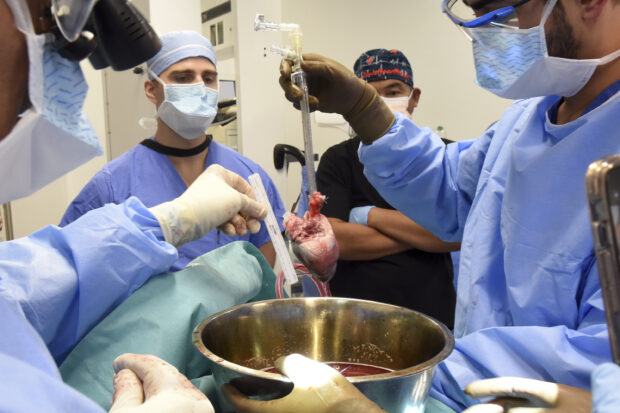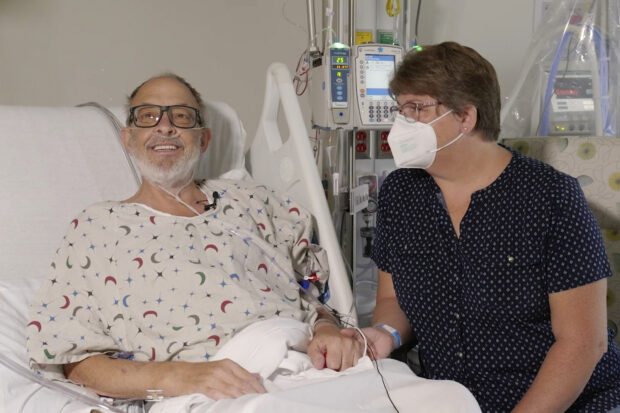Surgeons perform second pig heart transplant, trying to save a dying man

In this photo provided by the University of Maryland School of Medicine, surgeons prepare for a pig heart transplant into Lawrence Faucette at the school’s hospital in Baltimore, Md., in September 2023. Two days after the transplant, Faucette was cracking jokes and able to sit in a chair, doctors said Friday, Sept. 22, 2023. (Deborah Kotz/University of Maryland School of Medicine via AP)
WASHINGTON — Surgeons have transplanted a pig’s heart into a dying man in a bid to prolong his life – only the second patient to ever undergo such an experimental feat. Two days later, the man was cracking jokes and able to sit in a chair, Maryland doctors said Friday.
The 58-year-old Navy veteran was facing near-certain death from heart failure but other health problems meant he wasn’t eligible for a traditional heart transplant, according to doctors at University of Maryland Medicine.
“Nobody knows from this point forward. At least now I have hope and I have a chance,” Lawrence Faucette, from Frederick, Maryland, said in a video recorded by the hospital before Wednesday’s operation. “I will fight tooth and nail for every breath I can take.”
While the next few weeks will be critical, doctors were thrilled at Faucette’s early response to the pig organ.
“You know, I just keep shaking my head – how am I talking to someone who has a pig heart?” Dr. Bartley Griffith, who performed the transplant, told The Associated Press. He said doctors are feeling “a great privilege but, you know, a lot of pressure.”
The same Maryland team last year performed the world’s first transplant of a genetically modified pig heart into another dying man, David Bennett, who survived just two months.
There’s a huge shortage of human organs donated for transplant. Last year, there were just over 4,100 heart transplants in the U.S., a record number but the supply is so tight that only patients with the best chance of long-term survival get offered one.
Attempts at animal-to-human organ transplants have failed for decades, as people’s immune systems immediately destroyed the foreign tissue. Now scientists are trying again using pigs genetically modified to make their organs more humanlike.
Recently, scientists at other hospitals have tested pig kidneys and hearts in donated human bodies, hoping to learn enough to begin formal studies of what are called xenotransplants.
To make this new attempt in a living patient outside of a rigorous trial, the Maryland researchers required special permission from the Food and Drug Administration, under a process reserved for certain emergency cases with no other options.
It took over 300 pages of documents filed with FDA, but the Maryland researchers made their case that they’d learned enough from their first attempt last year – even though that patient died for reasons that aren’t fully understood – that it made sense to try again.
And Faucette, who retired as a lab technician at the National Institutes of Health, had to agree that he understood the procedure’s risks.

In this photo provided by the University of Maryland School of Medicine, Lawrence Faucette sits with wife, Ann, in the school’s hospital in Baltimore, Md., in September 2023, before receiving a pig heart transplant. Two days after the transplant, Lawrence was cracking jokes and able to sit in a chair, doctors said Friday, Sept. 22, 2023. (Deborah Kotz/University of Maryland School of Medicine via AP)
In a statement his wife, Ann Faucette, said: “We have no expectations other than hoping for more time together. That could be as simple as sitting on the front porch and having coffee together.”
What’s different this time: Only after last year’s transplant did scientists discover signs of a pig virus lurking inside the heart – and they now have better tests to look for hidden viruses. They also made some medication changes.
Possibly more important, while Faucette has end-stage heart failure and was out of other options, he wasn’t as near death as the prior patient.
By Friday, his new heart was functioning well without any supportive machinery, the hospital said.
“It’s just an amazing feeling to see this pig heart work in a human,” said Dr. Muhammad Mohiuddin, the Maryland team’s xenotransplantation expert. But, he cautioned, “we don’t want to predict anything. We will take every day as a victory and move forward.”
This kind of single-patient “compassionate use” can provide some information about how the pig organ works but not nearly as much as more formal testing, said Karen Maschke, a research scholar at the Hastings Center who is helping develop ethics and policy recommendations for xenotransplant clinical trials. That FDA allowed this second case “suggests that the agency is not ready to permit a pig heart clinical trial to start,” Mashke added.
The pig heart, provided by Blacksburg, Virginia-based Revivicor, has 10 genetic modifications – knocking out some pig genes and adding some human ones to make it more acceptable to the human immune system.